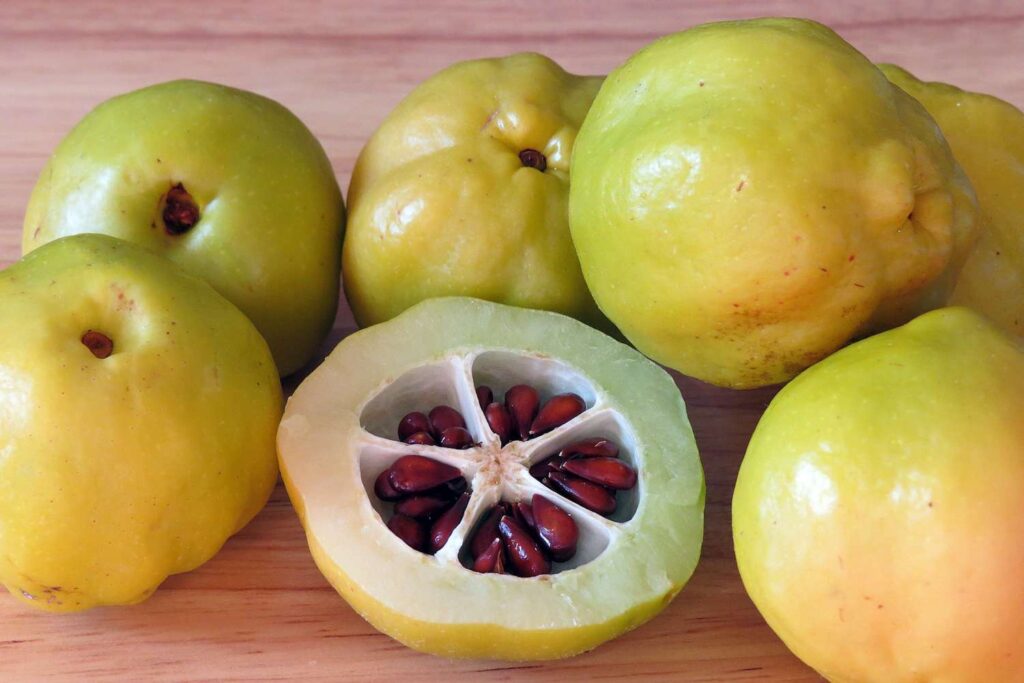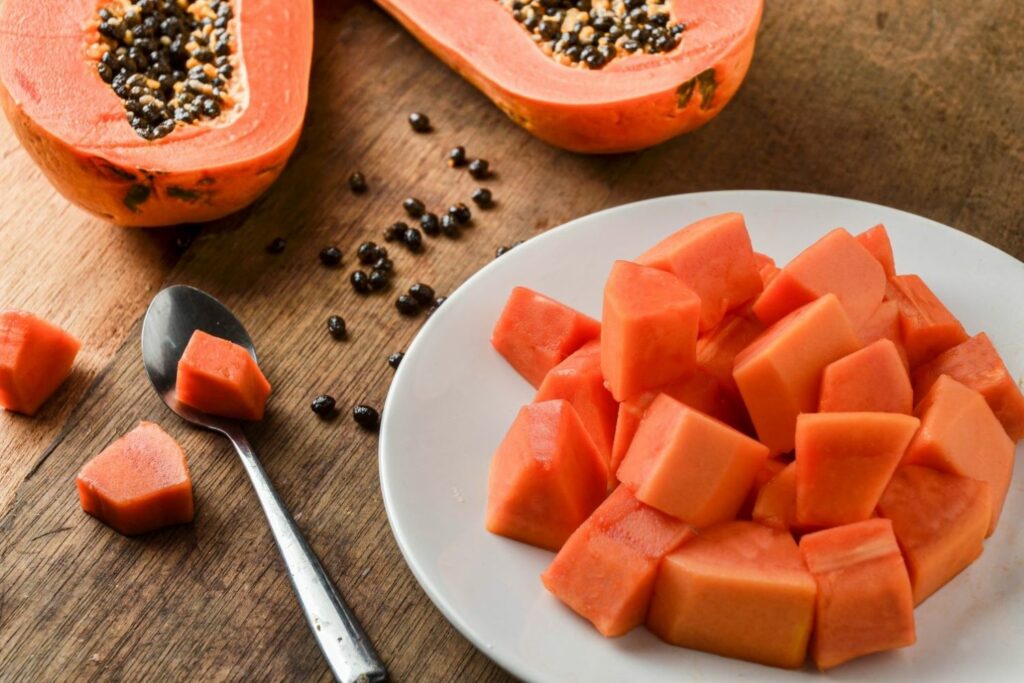Papaya is a great source of vitamin C, a potent antioxidant that boosts immunity, encourages skin health, and facilitates the synthesis of collagen.
A papaya’s papain enzyme facilitates the breakdown of proteins. Together with papaya’s high fiber content, this enzyme helps support a healthy digestive tract and ward off constipation.
Numerous anti-inflammatory substances found in papaya may help lessen inflammation in the body and ease the symptoms of inflammatory diseases.
Papaya’s antioxidants, fibre, and potassium all support heart health. Potassium aids in blood pressure regulation, and antioxidants and fibre maintain normal cholesterol levels.
Papaya is a great source of antioxidants that are good for the eyes, such as lutein, zeaxanthin, and beta-carotene. They might aid in shielding the eyes from additional vision issues like age-related macular degeneration.
Further research is necessary in this area, however, some studies indicate that the antioxidants and other bioactive chemicals in papaya may have preventive effects against specific forms of cancer.
Papaya’s vitamin C and other antioxidants support collagen synthesis, shield skin from oxidative damage, and lessen the appearance of aging in the skin.
A robust immune system, which aids in the body’s defence against diseases and disorders, depends on vitamin C. Regular papaya consumption can support a healthy immune system in general.
Papaya is high in fibre and relatively low in calories and fat. Papaya makes a filling and nutrient-dense snack, so incorporating it into a balanced diet can aid with weight management.
Papaya contains vitamin C, which is essential for wound healing because it promotes the formation of collagen and tissue repair.
According to certain research, papaya’s anti-inflammatory and muscle-relaxing qualities may help reduce menstruation pain.
Papaya provides minerals that are necessary for strong, healthy bones, including phosphorus, magnesium, and calcium.
q for quince:
Quince is a unique fruit that is rich in various nutrients and bioactive compounds, offering several health benefits. Here are some health benefits associated with consuming quince:

Quince is a great source of soluble and insoluble fibre from the food chain. This can support a healthy gut microbiome, avoid constipation, and improve digestive health.
Quince includes flavonoids, phenolic chemicals, and vitamin C as antioxidants. By scavenging free radicals, these antioxidants aid in lowering the body’s oxidative stress and inflammation.
Quince’s vitamin C level boosts immunity and aids the body’s defence against diseases and infections.
The fibre and potassium in quince contribute to heart health. Fibre can help keep cholesterol levels within normal ranges, and potassium helps control blood pressure.
Studies on the possible anti-inflammatory properties of certain quince components have shown promise in lowering inflammation within the body.
Quince’s fibre can support a healthy digestive tract and help with digestion. Furthermore, it could aid in the management of gastrointestinal disorders such as irritable bowel syndrome (IBS).
Because quince has a high fibre content and low calorie content, it is a delicious and low-calorie supplement to a balanced diet. This can support weight management initiatives.
The antioxidants in quince, including vitamin C, contribute to healthy skin by protecting it from oxidative damage and promoting collagen synthesis.
According to certain research, quince’s bioactive components may help control blood sugar levels. Those who have type 2 diabetes or are at risk for it may find this to be very pertinent.
There has been research on the possible anti-cancer effects of quince’s constituents, including flavonoids and triterpenoids. To completely comprehend these impacts, more research is necessary.
Quince includes minerals that are beneficial to bone health, such as iron and copper. Iron is necessary for the blood to carry oxygen, and copper aids in the production of collagen.
Chewing on quince may stimulate saliva production, which can help maintain oral health by neutralizing acids and reducing the risk of cavities.
R for raspberries:
Raspberries are not only delicious but also packed with essential nutrients, antioxidants, and health-promoting compounds. Here are some of the key health benefits associated with consuming raspberries:

Antioxidants such as quercetin, ellagic acid, and anthocyanins abound in raspberries. By scavenging free radicals from the body, these substances lessen inflammation and oxidative stress.
Vitamin C, an antioxidant that strengthens the immune system, encourages good skin, and helps produce collagen, is abundant in raspberries.
Both soluble and insoluble dietary fibre are abundant in raspberries. Because it encourages regular bowel movements, avoids constipation, and supports a healthy gut microbiota, fibre is crucial for digestive health.
The fibre, potassium, and antioxidants in raspberries help to heart health. Fibre and antioxidants may help reduce cholesterol, and potassium helps control blood pressure.
Raspberries’ low glycaemic index and high fibre content can help control blood sugar levels. For those who already have type 2 diabetes or are at risk, this is very advantageous.
Raspberries include anti-inflammatory antioxidants and polyphenolic substances that may help lessen inflammation in the body.
Because they are high in fibre and low in calories, raspberries are a satiating and nutrient-dense supplement to any weight-management programme.
According to certain research, the antioxidants in raspberries, especially ellagic acid, may be able to prevent some forms of cancer. Nonetheless, additional study in this field is required.
Raspberries contain flavonoids, which may help prevent age-related cognitive decline and have been linked to cognitive advantages.
Raspberries contain vitamins such as vitamin K and A, which are good for skin health, and antioxidants that shield the skin from oxidative damage and encourage the creation of collagen.
Compounds found in raspberries, such as lutein and zeaxanthin, are beneficial to eye health and may offer some protection against age-related macular degeneration.
Manganese, which is important for the development and preservation of bones, is one of the minerals found in raspberries.
s for strawberries:
Strawberries are not only delicious but also packed with essential nutrients and health-promoting compounds. Here are some of the key health benefits associated with consuming strawberries:

Antioxidants found in strawberries include ellagic acid, quercetin, vitamin C, and anthocyanins. By scavenging free radicals, these antioxidants aid in lowering the body’s oxidative stress and inflammation.
Vitamin C, a potent antioxidant that strengthens the immune system, encourages good skin, and helps produce collagen, is abundant in strawberries.
Dietary fibre, especially soluble fibre, is abundant in strawberries. In addition to encouraging regular bowel movements, avoiding constipation, and maintaining a healthy gut microbiota, fibre is crucial for digestive health.
Strawberries’ fibre, potassium, and antioxidants are good for your heart. Fibre and antioxidants may help reduce cholesterol, and potassium helps control blood pressure.
Strawberries’ low glycaemic index and high fibre content can help control blood sugar levels. This is good for persons with or at risk of type 2 diabetes.
Strawberries include antioxidants with anti-inflammatory qualities, including quercetin, which may help lessen inflammation in the body.
Strawberries are relatively low in calories and high in fibre, making them a satisfying and nutrient-dense snack. Including strawberries in a balanced diet can support weight management.
According to some research, antioxidants found in strawberries, like ellagic acid, may be able to prevent some forms of cancer. Nonetheless, additional study in this field is required.
Strawberries include flavonoids, which may help prevent age-related cognitive decline and have been linked to cognitive advantages.
The antioxidants in strawberries contribute to healthy skin by protecting it from oxidative damage and promoting collagen synthesis. Additionally, strawberries contain vitamins like vitamin A and vitamin C, which are beneficial for skin health.
Compounds found in strawberries, such as zeaxanthin and lutein, are beneficial to eye health and may offer protection against age-related macular degeneration.
Essential elements included in strawberries include manganese, which is important for the development and preservation of bones.
T for tomato:
Tomatoes are not only a versatile and delicious addition to various dishes but also offer a range of health benefits. Here are some key health benefits associated with consuming tomatoes:

Beta-carotene, lycopene, and vitamin C are among the antioxidants found in tomatoes. By scavenging free radicals, antioxidants aid in the body’s reduction of oxidative stress and inflammation.
Tomatoes contain lycopene, a potent antioxidant that is associated with cardiovascular health. It might assist in lowering cholesterol, blood pressure, and enhancing blood vessel health.
According to some research, tomatoes’ lycopene may offer protection against several cancers, including prostate cancer. Tomatoes also include other antioxidants that may help prevent cancer.
Tomatoes include lutein and zeaxanthin, which are good for the eyes and may help stop age-related macular degeneration.
Tomatoes include antioxidants, such as vitamin C, which support collagen synthesis, shield skin from oxidative damage, and lessen the appearance of ageing.
For healthy bones, tomatoes are a good source of calcium and vitamin K. Calcium is a vital component of bone construction, and vitamin K plays a role in bone mineralization.
Tomatoes include some substances with anti-inflammatory qualities, such as kaempferol and quercetin, which may help lessen inflammation in the body.
Because they are high in fibre and low in calories, tomatoes are a satisfying and healthy complement to any weight-loss strategy.
Tomatoes’ low glycaemic index and high fibre content can help control blood sugar levels. For those who already have type 2 diabetes or are at risk, this is very advantageous.
Tomato fibre maintains a healthy digestive tract, helps avoid constipation, and encourages good digestion.
Because of their high water content, tomatoes help keep you hydrated generally. Numerous body processes depend on maintaining proper hydration.
Vitamin C, potassium, folate, and vitamin A are among the vital components found in tomatoes that support general health.
For more interesting blogs related to health benefits.


